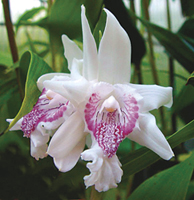 The tropics are an evolutionary powerhouse–the most diverse and complex assemblages of plants, animals and microorganisms on Earth. At least two-thirds of all known plants and animals are found there, and thousands of new species are discovered each year. How we use the wealth of biological resources in the tropics has a profound effect on the health of our planet. But today these resources are being consumed rather than managed.
The tropics are an evolutionary powerhouse–the most diverse and complex assemblages of plants, animals and microorganisms on Earth. At least two-thirds of all known plants and animals are found there, and thousands of new species are discovered each year. How we use the wealth of biological resources in the tropics has a profound effect on the health of our planet. But today these resources are being consumed rather than managed.
Tropical forests once covered at least one-eighth of Earth's land mass, an area roughly twice the size of Europe. Currently at least 40 million acres are cleared or degraded annually–an area larger than Maryland, Massachusetts, and Rhode Island combined. If present trends continue, tropical forests will be reduced to fragments–just five percent of their original area–in the next 50 years.
The consequences for global climate change are potentially disastrous. Once a forest is altered, the area loses its ability to retain moisture, leading to reduced rainfall, and when rains do come, degraded sites experience devastating soil loss and flooding. As more forests are cleared, the sustainability of wider regions is threatened. Worldwide, a decline in tropical forest cover allows more solar energy to be radiated back into the atmosphere, disrupting wind currents and rainfall far outside the tropics.